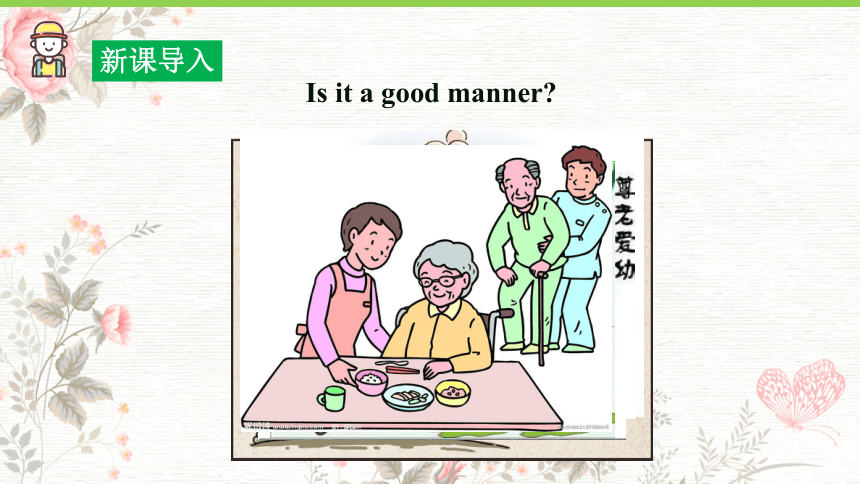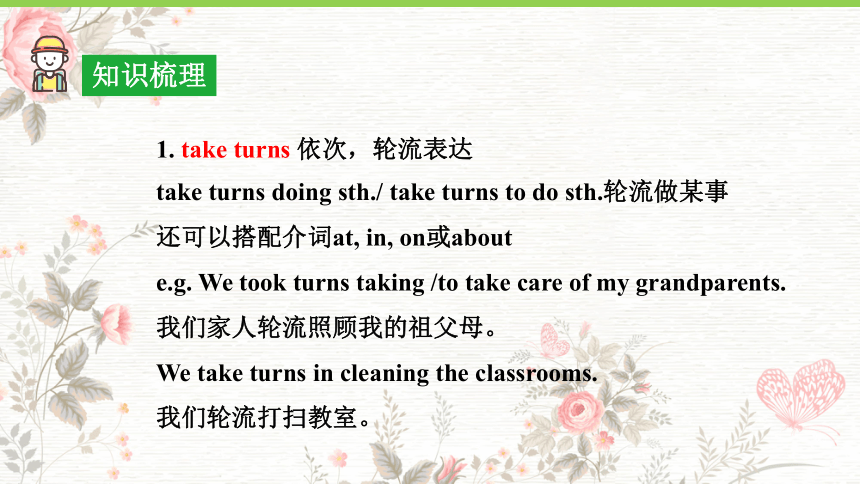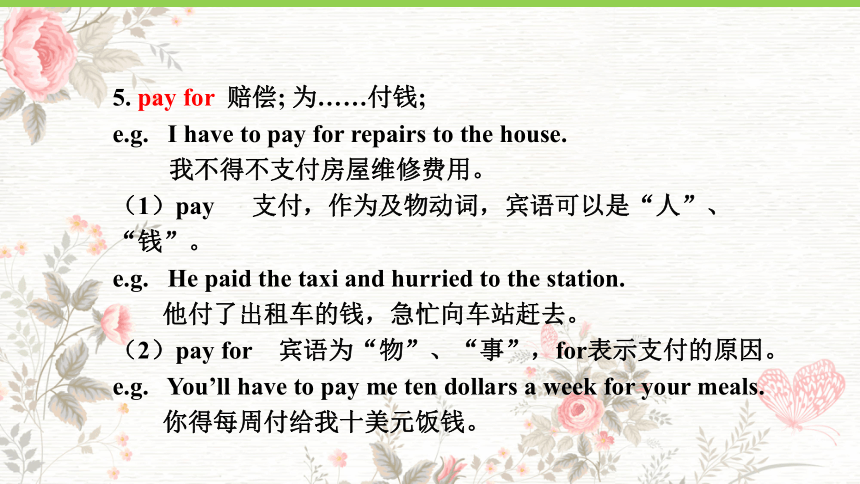Unit 8 Culture Shapes Us Lesson 45 课件(共26张PPT) 2023-2024学年冀教版英语九年级全一册
文档属性
| 名称 | Unit 8 Culture Shapes Us Lesson 45 课件(共26张PPT) 2023-2024学年冀教版英语九年级全一册 |  | |
| 格式 | pptx | ||
| 文件大小 | 14.1MB | ||
| 资源类型 | 教案 | ||
| 版本资源 | 冀教版 | ||
| 科目 | 英语 | ||
| 更新时间 | 2024-03-01 11:15:16 | ||
图片预览









文档简介
(共26张PPT)
Unit 8
Lesson 45
Different Manners
新课导入
Is it a good manner
1.掌握本课新单词: though, praise, private, guest, manners, modest, virtue, elderly, extra, waiter, tip
2.掌握本课短语: take turns, a sign of, embarrassed about, be done, pay for
3.了解加拿大与中国之间的礼仪差异
预习检测
1.—What a nice model plane!
—Thanks. I made it with 3-D printer by______.
A. me B. him C. itself D. myself
2. Lucy likes staying at home. She ______goes traveling during holidays.
A. usually B. seldom C. always D. often
D
B
3.____ vegetable juice is a good habit, which helps you eat a balanced diet.
A. Drink B. Drank C. Drunk D. Drinking
4.—You should _____ your son. He works harder than before.
—Thanks, I will.
A.praise B. punish C. prove D. provide
5.Please take turns _____ food in the restaurant.
A. buy B. buying C. buys D. bought
D
A
B
知识梳理
1. take turns 依次,轮流表达
take turns doing sth./ take turns to do sth.轮流做某事
还可以搭配介词at, in, on或about
e.g. We took turns taking /to take care of my grandparents.
我们家人轮流照顾我的祖父母。
We take turns in cleaning the classrooms.
我们轮流打扫教室。
2. a sign of 一个迹象;一种标志
e.g. The involvement of the foreign ministers was itself a sign of progress.
外交部长的介入本身就是取得进展的一个标志。
拓展:as a sign of 以示
as a sign of respect 以示尊敬
as a sign of loyalty 以示效忠
3. embarrassed about sth. 对……感到尴尬
4. be done 做;完毕
embarrass vt.& vi. (使)窘迫,(使)局促不安;
e.g. I was embarrassed about what had happened.
我对发生的事情感到尴尬。
e.g. We must see what can be done.
我们应该看看有什么能做的。
What is the next thing to be done
其次要做的事是什么?
5. pay for 赔偿; 为……付钱;
e.g. I have to pay for repairs to the house.
我不得不支付房屋维修费用。
(1)pay 支付,作为及物动词,宾语可以是“人”、“钱”。
e.g. He paid the taxi and hurried to the station.
他付了出租车的钱,急忙向车站赶去。
(2)pay for 宾语为“物”、“事”,for表示支付的原因。
e.g. You’ll have to pay me ten dollars a week for your meals.
你得每周付给我十美元饭钱。
了解不同国家不同的风俗习惯
When people meet a friend
In China
In America
In Japan
shake hands
hug each other
bow to each other
In China
In the West
When people have a meal
In China
In the West
Different festivals
Christmas
the Spring Festival
My name is Wu Zhou, I have lived in Canada for twenty-three years. In Canada, I call myself Joe Wu. Joe is an English name that sounds like Zhou.
Though I have lived here for a long time, I still don’t feel Canadian. This is probably because North American manners and Chinese manners are so different.
In China, being modest is a virtue, If someone praises you and says that your English is excellent, you should be modest and say, “No, no. My English is still poor.”
I have many good friends in Canada, though Canadian culture is different from Chinese culture.
But in North America, this is usually a sign of being weak and not confident. You should just say, “Thank you.”
In Canada, people only ask children about their age. It’s not polite to ask an adult’s age. They think it is private. But this is common in many places in China.
In both China and North America, it is polite to offer an elderly person a seat on the bus. In North America, however, an elderly person may feel embarrassed about being offered a seat.
When Chinese people eat out in restaurants they may take turns paying for the meal. In Canada, however, people often share the cost of a meal.
In China, if your guests have no food on their plates, it’s polite to put food on their plates. In Canada, you pass food to guests, but you don’t usually put food on their plates.
In China, people seldom give extra money to waiters, waitresses, taxi drivers or hotel workers. In North America , this is always done. It is called “tipping”.
It’s interesting to experience two different cultures. I think understanding cultural differences really helps us to understand each other,live together and work together.
1 Read the lesson and match the behaviours with the correct countries.
China
Canada
asking an adult’s age
putting food on a guest’ s plate
giving a tip to waiters and hotel workers
sharing the cost of a meal in a restaurant
Let's Do It!
3 Fill in the blanks with the words or phrases in the box.
1.We should ________ little Debbie for her courage.
2.It's a long way. We can ____________ driving.
3.They asked him to ________ the damage,but he refused.
4.Don't talk about other people's ________ things. It's not polite.
5.Jack is a ________ man who is admired by many people.
praise
take turns
pay for
private
modest
Let's Do It!
pay for praise take turns modest private
4 What cultural differences,besides the ones already discussed,have you noticed between China and English speaking countries Share your ideas with your classmates.
Different
manners
greeting,parting
table manners
festivals
receiving
gifts
teaching
system
invitation
Let's Do It!
活动小结
通过以上活动,我们知道了中国与其他国家的一些风俗习惯的差别,由餐桌礼仪、就餐习惯、社会公德方面进行了比较。
进一步学习although,though引导的让步状语从句
Adverbial clause with "though" and "although".
(1)Though Wu Zhou has lived in Canada for 23 years, he still doesn't feel Canadian.
(2)Although Canadian culture is different from Chinese culture, he has many good friends in Canada.
(3)In China if someone praises you, you should be modest, but in Canada you should just say "Thanks".
"Although/ though" and "but" are used when there is a contrast between two objects. You shouldn't use "but" and "although/though" together.
2 Match and complete the sentences.
Although people have different cultures and customs,
Brian hasn’t been to China,
He has been at the new school for only a few days,
Though Liu Feng has many friends in America,
but he has already made many friends there.
they have the same feelings.
he still feels lonely.
but he knows a lot about our country.
Note that we should not use “although/though” and
“but” together in the same sentence.
Let's Do It!
活动小结
通过以上活动,我们学习了由although/though引导的状语从句,需要注意的是,although/though不能与______出现在同一个句子里。
but
当堂检测
一、用所给单词的适当形式填空。
1. They live in a small town_______ (call) Blue Moon.
2. Danny ____________ (praise) by his teacher for his good work.
3. What about ________ (tell) them our new address
4. He said he ____________ (live) in this city for ten years.
5. Thank you very much for ________ (teach) us so well.
called
was praised
telling
had lived
teaching
二、根据汉语意思完成句子。
1.尽管她很聪明,但还是不能算出这道数学题。
__________________she is clever, she can't _____ ______ the math problem.
2.在中国谦虚是一种美德。
Being _______ is a ________in China.
3.在中国把食物放在客人盘子里是很有礼貌的。
It's_______ ____ ______food_______ the guests’ plates in China.
4.你曾经给过服务员小费吗?
Did you use to give _________money to__________
Though/Although
work out
modest
virtue
polite to put on
extra
waiters
Unit 8
Lesson 45
1.掌握本课新单词: though, praise, private, guest, manners, modest, virtue, elderly, extra, waiter, tip
2.掌握本课短语: take turns, a sign of, embarrassed about, be done, pay for
3.了解加拿大与中国之间的礼仪差异
Unit 8
Lesson 45
Different Manners
新课导入
Is it a good manner
1.掌握本课新单词: though, praise, private, guest, manners, modest, virtue, elderly, extra, waiter, tip
2.掌握本课短语: take turns, a sign of, embarrassed about, be done, pay for
3.了解加拿大与中国之间的礼仪差异
预习检测
1.—What a nice model plane!
—Thanks. I made it with 3-D printer by______.
A. me B. him C. itself D. myself
2. Lucy likes staying at home. She ______goes traveling during holidays.
A. usually B. seldom C. always D. often
D
B
3.____ vegetable juice is a good habit, which helps you eat a balanced diet.
A. Drink B. Drank C. Drunk D. Drinking
4.—You should _____ your son. He works harder than before.
—Thanks, I will.
A.praise B. punish C. prove D. provide
5.Please take turns _____ food in the restaurant.
A. buy B. buying C. buys D. bought
D
A
B
知识梳理
1. take turns 依次,轮流表达
take turns doing sth./ take turns to do sth.轮流做某事
还可以搭配介词at, in, on或about
e.g. We took turns taking /to take care of my grandparents.
我们家人轮流照顾我的祖父母。
We take turns in cleaning the classrooms.
我们轮流打扫教室。
2. a sign of 一个迹象;一种标志
e.g. The involvement of the foreign ministers was itself a sign of progress.
外交部长的介入本身就是取得进展的一个标志。
拓展:as a sign of 以示
as a sign of respect 以示尊敬
as a sign of loyalty 以示效忠
3. embarrassed about sth. 对……感到尴尬
4. be done 做;完毕
embarrass vt.& vi. (使)窘迫,(使)局促不安;
e.g. I was embarrassed about what had happened.
我对发生的事情感到尴尬。
e.g. We must see what can be done.
我们应该看看有什么能做的。
What is the next thing to be done
其次要做的事是什么?
5. pay for 赔偿; 为……付钱;
e.g. I have to pay for repairs to the house.
我不得不支付房屋维修费用。
(1)pay 支付,作为及物动词,宾语可以是“人”、“钱”。
e.g. He paid the taxi and hurried to the station.
他付了出租车的钱,急忙向车站赶去。
(2)pay for 宾语为“物”、“事”,for表示支付的原因。
e.g. You’ll have to pay me ten dollars a week for your meals.
你得每周付给我十美元饭钱。
了解不同国家不同的风俗习惯
When people meet a friend
In China
In America
In Japan
shake hands
hug each other
bow to each other
In China
In the West
When people have a meal
In China
In the West
Different festivals
Christmas
the Spring Festival
My name is Wu Zhou, I have lived in Canada for twenty-three years. In Canada, I call myself Joe Wu. Joe is an English name that sounds like Zhou.
Though I have lived here for a long time, I still don’t feel Canadian. This is probably because North American manners and Chinese manners are so different.
In China, being modest is a virtue, If someone praises you and says that your English is excellent, you should be modest and say, “No, no. My English is still poor.”
I have many good friends in Canada, though Canadian culture is different from Chinese culture.
But in North America, this is usually a sign of being weak and not confident. You should just say, “Thank you.”
In Canada, people only ask children about their age. It’s not polite to ask an adult’s age. They think it is private. But this is common in many places in China.
In both China and North America, it is polite to offer an elderly person a seat on the bus. In North America, however, an elderly person may feel embarrassed about being offered a seat.
When Chinese people eat out in restaurants they may take turns paying for the meal. In Canada, however, people often share the cost of a meal.
In China, if your guests have no food on their plates, it’s polite to put food on their plates. In Canada, you pass food to guests, but you don’t usually put food on their plates.
In China, people seldom give extra money to waiters, waitresses, taxi drivers or hotel workers. In North America , this is always done. It is called “tipping”.
It’s interesting to experience two different cultures. I think understanding cultural differences really helps us to understand each other,live together and work together.
1 Read the lesson and match the behaviours with the correct countries.
China
Canada
asking an adult’s age
putting food on a guest’ s plate
giving a tip to waiters and hotel workers
sharing the cost of a meal in a restaurant
Let's Do It!
3 Fill in the blanks with the words or phrases in the box.
1.We should ________ little Debbie for her courage.
2.It's a long way. We can ____________ driving.
3.They asked him to ________ the damage,but he refused.
4.Don't talk about other people's ________ things. It's not polite.
5.Jack is a ________ man who is admired by many people.
praise
take turns
pay for
private
modest
Let's Do It!
pay for praise take turns modest private
4 What cultural differences,besides the ones already discussed,have you noticed between China and English speaking countries Share your ideas with your classmates.
Different
manners
greeting,parting
table manners
festivals
receiving
gifts
teaching
system
invitation
Let's Do It!
活动小结
通过以上活动,我们知道了中国与其他国家的一些风俗习惯的差别,由餐桌礼仪、就餐习惯、社会公德方面进行了比较。
进一步学习although,though引导的让步状语从句
Adverbial clause with "though" and "although".
(1)Though Wu Zhou has lived in Canada for 23 years, he still doesn't feel Canadian.
(2)Although Canadian culture is different from Chinese culture, he has many good friends in Canada.
(3)In China if someone praises you, you should be modest, but in Canada you should just say "Thanks".
"Although/ though" and "but" are used when there is a contrast between two objects. You shouldn't use "but" and "although/though" together.
2 Match and complete the sentences.
Although people have different cultures and customs,
Brian hasn’t been to China,
He has been at the new school for only a few days,
Though Liu Feng has many friends in America,
but he has already made many friends there.
they have the same feelings.
he still feels lonely.
but he knows a lot about our country.
Note that we should not use “although/though” and
“but” together in the same sentence.
Let's Do It!
活动小结
通过以上活动,我们学习了由although/though引导的状语从句,需要注意的是,although/though不能与______出现在同一个句子里。
but
当堂检测
一、用所给单词的适当形式填空。
1. They live in a small town_______ (call) Blue Moon.
2. Danny ____________ (praise) by his teacher for his good work.
3. What about ________ (tell) them our new address
4. He said he ____________ (live) in this city for ten years.
5. Thank you very much for ________ (teach) us so well.
called
was praised
telling
had lived
teaching
二、根据汉语意思完成句子。
1.尽管她很聪明,但还是不能算出这道数学题。
__________________she is clever, she can't _____ ______ the math problem.
2.在中国谦虚是一种美德。
Being _______ is a ________in China.
3.在中国把食物放在客人盘子里是很有礼貌的。
It's_______ ____ ______food_______ the guests’ plates in China.
4.你曾经给过服务员小费吗?
Did you use to give _________money to__________
Though/Although
work out
modest
virtue
polite to put on
extra
waiters
Unit 8
Lesson 45
1.掌握本课新单词: though, praise, private, guest, manners, modest, virtue, elderly, extra, waiter, tip
2.掌握本课短语: take turns, a sign of, embarrassed about, be done, pay for
3.了解加拿大与中国之间的礼仪差异
同课章节目录
- Unit 7 Work for Peace
- Lesson 37 Don't Fight!
- Lesson 38 Making School a Better Place
- Lesson 39 The Dove and the Olive Branch
- Lesson 40 The UN—Power of Words
- Lesson 41 Jenny's Good Advice
- Lesson 42 Peace at Last
- Unit Review
- Unit 8 Culture Shapes Us
- Lesson 43 A Visit to Chinatown
- Lesson 44 Popular Sayings
- Lesson 45 Different Manners
- Lesson 46 Home to Many Cultures
- Lesson 47 Good Manners
- Lesson 48 Supper with the Bradshaws
- Unit Review
- Unit 9 Communication
- Lesson 49 Get Along with Others
- Lesson 50 Tips for Good Communication
- Lesson 51 What Could Be Wrong?
- Lesson 52 The Power of a Smile
- Lesson 53 Working in Groups
- Lesson 54 How Embarrassing!
- Unit Review
- Unit 10 Get Ready for the Future
- Lesson 55 Look into the Future
- Lesson 56 Manage Your Time
- Lesson 57 Best Wishes
- Lesson 58 Ms.Liu's Speech
- Lesson 59 Keep Your Choices Open
- Lesson 60 Get a Good Education
- Unit Review
